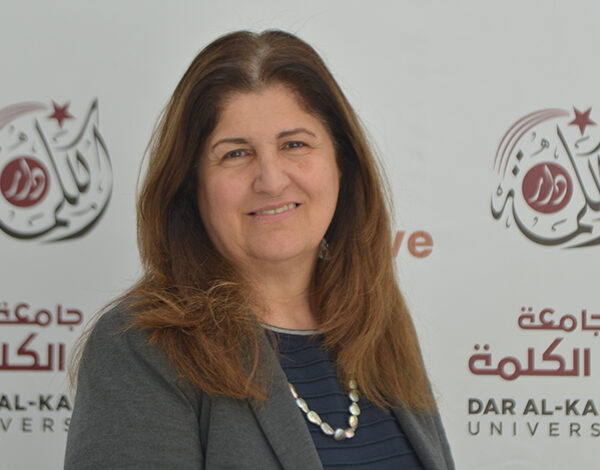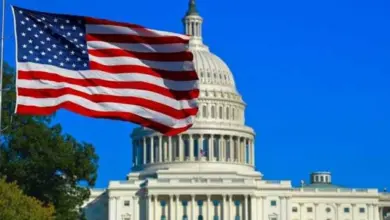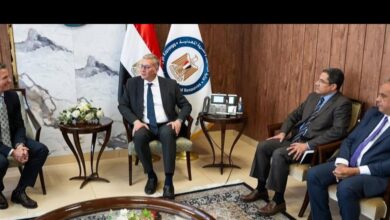
In her first interview after taking oath of office in March, the Palestinian Minister of State for Foreign Affairs and Immigration, Farsin Shaheen, told Al-Masry Al-Youm that what is happening in the Gaza Strip is a new “catastrophe” after the first that occurred in 1948.
Shaheen shed light on the hurdles which refugees currently suffer from and how the situation has dramatically deteriorated in Gaza at all levels.
She described Egypt as a “big sister”, praising its constant efforts to stop the war of genocide against Gaza.
Shaheen wrapped up her words by insisting that the only way to stop this aggression is to recognize the State of Palestine on the entire territory occupied in 1967.
What were the positions you held before becoming the Minister of State for Foreign Affairs and Immigration?
Over the past years, my career has varied between academic, administrative, and political work. I held several positions in Palestinian universities, and worked with many local and international institutions as an expert in strategic affairs and administrative reform.
I have accumulated important experience at the level of developing institutions and developing policies for administrative work and the tasks assigned to me in various Sectors: Perhaps the most prominent stations are my work in the Negotiations Support Unit of the Palestine Liberation Organization, the Supreme Presidential Committee for Church Affairs, and the Welfare Association, in addition to my work as Commissioner General of the Independent Commission for Palestinian Human Rights. I also contributed to developing many strategic plans at the national level, and worked in several sectors in the city of Jerusalem.
What is the role of your ministry?
Our role lies in pursuing foreign service to achieve the foreign policy agenda of the Palestine Liberation Organization, including bilateral and multilateral diplomatic relations and providing the necessary support and service to Palestinians abroad as a supreme national interest. We will work to continue strengthening political and diplomatic support for us and deepening international support in order to consolidate justice and peace and protecting Palestinian national interests.
What are the tasks of the new Palestinian government in light of the ongoing war on the Gaza Strip?
From the first moment, the new government, headed by Prime Minister Muhammad Mustafa, began developing plans at the level of ministerial committees, in order to achieve urgent relief for our people in the Gaza Strip and mobilize international efforts to support the official Palestinian directions to stop the war of genocide, relief and reconstruction, and discuss Prospects for moving from the urgent relief phase to socio-economic work without forgetting our role in advancing the various vital sectors, including education, health, municipalities and infrastructure, which the recent genocide war caused systematic destruction in the Gaza Strip, and reform and performance development are among the core priorities of the government.
I confirm that the government’s work has not stopped in the Gaza Strip through the teams of its ministries and authorities, represented by the Water and Energy Authority to connect and maintain water and electricity lines, and its support is required from the various factions and national forces.
How do you see Egypt’s role in resolving the Palestinian issue and stopping the war on Gaza?
Egypt is considered the big sister, and we always thank it for its tireless efforts in supporting the Palestinian people, whether in the United Nations or at the political level by working to stop the genocidal war that the people of the Gaza Strip have been subjected to since October 7, or at the humanitarian and food levels by ensuring the entry of food, medicine, and humanitarian aid, as well as caring for the people of the Gaza Strip who are being treated in Egyptian hospitals.
How do you describe the ongoing war on Gaza, and is the West Bank far from the Gaza scenario?
– Since its inception, the Zionist project has continued to expel the Palestinians from their land, confiscate the land, and obliterate the Palestinian identity and existence by all military, political and administrative means and means. Perhaps what happened and is happening in the city of Jerusalem (the capital of Palestine) of isolation and confiscation of lands and daily restrictions on citizens proves that Israeli policy is no different. In essence, what is happening in Gaza, although it depends on a parallel pace in the West Bank, where the rate of confiscation of Palestinian lands and control of their wealth reached an unprecedented rate during the last period under the current Israeli government, and since last October 7, the rate of confiscation of Palestinian lands has reached about 27 percent. One thousand dunams (27 square kilometers) of West Bank land.
For your information, the Gaza scenario is always present in Israeli policy, and therefore it is not possible to believe and accept that the West Bank is isolated from the occupation’s military policies. Since last October 7, and without limitation, the occupation forces have arrested more than 7,500 Palestinians from the West Bank.
In conjunction with what is happening in the Gaza Strip, what are the estimates of the numbers of refugees and displaced persons?
– Israeli military operations in the Gaza Strip aim at forced displacement, contrary to what Israeli officials claim that it is voluntary migration, and that turning the need for food, water, electricity, health care, etc. into weapons of war against the people of the Gaza Strip aims to rob them of their daily rights and push them into the unknown. This is clearly indicated by statistics from many international institutions, such as Oxfam and Human Rights Watch, regarding the rate of famine and internal and external displacement.
Is Europe about to receive new Palestinian refugees, if matters become more complicated?
We look forward to a European role that strengthens the Palestinian presence on the land of Palestine and adherence to international conventions, and to help us reject and confront displacement plans, especially since the people of the Gaza Strip and the people of Palestine in general cling to their land and refuse to leave their country.
What are the problems refugees currently face compared to the post -October 7 crisis?
With regard to those displaced from the genocidal war on Gaza since October 7, the scene is tragic in all its dimensions, as more than one and a half million displaced people are now languishing in tents and temporary housing in the Palestinian Rafah, while those who remain stuck in the north are suffering from an acute food shortage and health care, etc. They are also constantly exposed to various forms of violations carried out by the occupation army stationed close to Palestinian residential communities, which they periodically attack and bomb, to force what remains in the northern Gaza Strip to move south.
This scene reminds us of the suffering of nearly a million Palestinians who were pushed by the Zionist militias due to the massacres and intimidation they committed that led to their displacement to neighboring countries during the Nakba War in 1948. The current suffering is no different from what it was 76 years ago. Rather, it can be said that the suffering of the new Nakba is more It takes place in full view of the world.
How do you perceive the role of the international community regarding what is happening in the Gaza Strip?
– Palestine is an essential part of the international community, and based on our belief in the necessity of this effective presence, we expect the international community, represented by its bodies, institutions and governments, to be fair and committed to implementing all resolutions issued by the United Nations, whether by the General Assembly and the Security Council, and to provide Necessary protection for the Palestinian people by adopting firm mechanisms to ensure justice and achieve stability in the region through official recognition of the State of Palestine. We look forward to our partners around the world quickly taking the necessary decisions to stop the genocide in Gaza and recognize the Palestinian state on the borders of June 4, 1967.
It is time for the international community to protect the international justice system through accountability and accountability and stop considering Israel a state above the law.
Will the reconciliation file be on the agenda of the newly-appointed Palestinian Authority Prime Minister Mohammed Mustafa’s government?
– Muhammad Mustafa’s government No. 19 is a government of national competencies, far from partisan orientations. Its priorities are relief, restoring the economy, developing institutions, and serving our one people. We hope that all Palestinians, that is, all factions, will facilitate their work.
What is the solution to the Gaza Strip issue?
What is happening in the Gaza Strip is not separate from the rest of the Palestinian regions, but rather is at the heart of the crimes committed by the occupation authorities against our people everywhere, and therefore the only way to stop this aggression is to recognize the State of Palestine on the entire territory occupied in 1967.
What are the expected scenarios after the end of the war?
Let the war of extermination stop on the Gaza Strip first, and then we will talk about all the expected scenarios, which are at the core of the Palestinian leadership’s concern.




